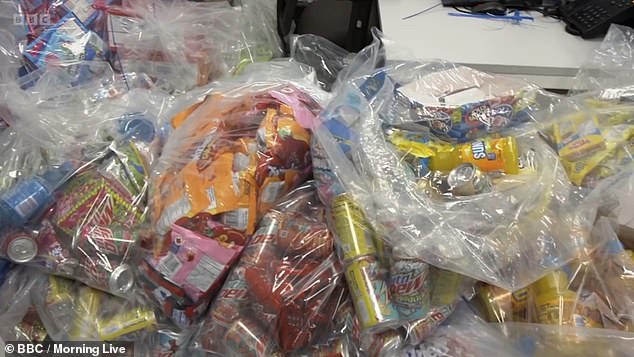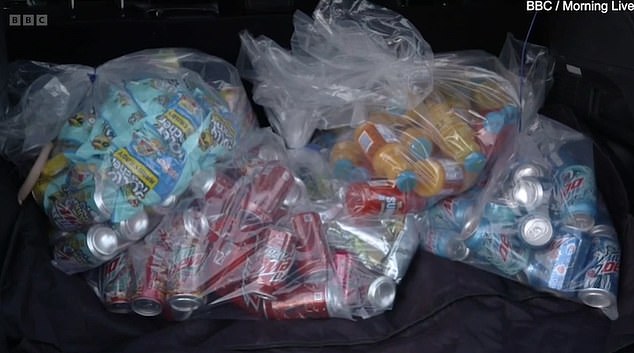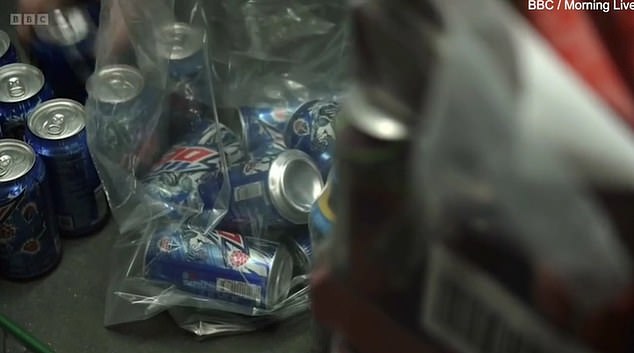Watchdog calls on US to ban candy cancer chemicals as UK begins SEIZING Mountain Dew, Jolly Ranchers, Swedish Fish and Lemonheads amid crackdown on American junk food that is linked to infertility and health issues
A US watchdog has told DailyMail.com that the seizure of American sweets in Britain should be a wake-up call for the whole country.
Footage emerged on Monday showing workers putting sweets – found in almost every US store – into garbage bags, as regulators crack down on US imports.
Candies such as Jolly Ranchers, Swedish Fish and Lemonheads contain several additives that are legal in the US but banned under EU and UK law due to their links to cancer, infertility and other problems.
Consumer Reports said the video should spark a shift in food policy in the US and urged officials here to “do more” to protect adults and children.
They called for expanding the list of food additives banned in the US – to include more food dyes and chemicals that were banned years ago in Europe.
Consumer Reports said this should be a turning point for the U.S., urging officials to ban more food dyes and additives that were banned in Europe years ago.

Trade standards officers seized thousands of popular American candies and soft drinks. Pictured above are Mountain Dew, Twizzlers, Jolly Ranchers, Sunny D and Swedish Fish seized by officials
Brian Ronholm, the agency's director of food policy, told DailyMail.com: 'The chemical additives that will be banned under California law are certainly a good start to tackling this problem in the US.
'However, more needs to be done, as this import campaign in Britain shows.
“The list of chemical additives to target and scrutinize should be expanded to include synthetic food dyes and other chemicals that have been linked to cancer and other adverse health conditions.”
He added: “What is ultimately needed in the US is for the FDA to modernize and strengthen its regulatory process for food additives.”
The Food and Drugs Administration has come under increasing pressure in recent months to tighten regulations on food additives.
California took the initiative and banned four food additives – brominated vegetable oil, potassium bromate, propyl paraben and red dye No. 3 – amid concerns about their links to cancer and other health problems.
New York and Pennsylvania now also want to follow suit, DailyMail.com exclusively announced.
But so far the FDA has only offered to reconsider one food additive, brominated vegetable oil, amid studies warning of its link to cancer.
The United Kingdom and the European Union banned many of these additives decades ago.
Representatives in California say everyone in America deserves to be “just as protected” as people in Europe.

Above are bags of Jolly Ranchers, Mountain Dew and Sunny D seized by officials in Britain

Above are cans of Mountain Dew seized by officials in Britain
Dr. Carolyn Williams, a dietitian from Alabama, told DailyMail.com she hoped the images would “motivate” US regulators to take action.
“We should move like Europe moves, like California moves,” she said. “That would be a great first step for the country.”
'We are far too late in the US to adopt some of the EU's food policy.'
The mother-of-two added: “I wish the additive ban would make its way into the US.
'I saw the effects of food additives very early in one of my children.
'There's a blue food coloring, a blue food coloring, and I noticed that when he ate this particular blue food coloring – it's in some cakes and in some candies – his hyperactivity went through the roof.
The food additives Blue 1 and Blue 2 have been linked to hyperactivity by some studies.
At least nine popular American products are now being seized by officials in Britain because of the ingredients they contain.
Among them are Twizzlers and Lemonheads, which are being pulled from shelves because they contain mineral oil – a substance derived from petroleum that increases the risk of cancer.
Dubble Bubble is removed because it contains BHT or butylated hydroxytoluene, which research has shown can promote tumor growth and hinder blood clotting.
British officials have also cracked down on Mountain Dew because it contains calcium disodium EDTA, which has been linked to cancer.
And Sunny D and Mirinda were seized because they contained potassium sorbate, a food preservative that increases the risk of allergic reactions.
Mineral oil, BHT, calcium disodium and potassium sorbate are all banned in food products in Britain due to the health risks.
British officials also seized Swedish Fish, Jolly Ranchers and Hot Tamales because they contained color additives, including Red 40, Yellow 5, Yellow 6 and Blue 1, which are linked to hyperactivity in children, such as Attention Deficit Hyperactivity Disorder (ADHD) and ADHD . problems with the immune system.
John Herriman, the CEO of the UK's Chartered Trading Standards Institute behind the seizures, said: 'The UK prides itself on its high food standards, but this is highly dependent on trading standards that ensure what is for sale meets the law complies.
'It is therefore extremely worrying to hear that, as we approach Christmas, sweets that we know will appeal to children are on sale on the high streets in Britain and that this may be linked to hyperactivity in children and even cancer.”
Victoria Wilson, cabinet member for trading standards in part of Britain, said: 'It is quite worrying to see so many products on the market that shouldn't be. Many of these contain unauthorized ingredients and are aimed at children.'
The products were seized from 22 stores in Staffordshire, an area in the Midlands of Great Britain, just above Birmingham.
The products were all manufactured for sale in the US market, but were later imported into the UK.
Manufacturers said their products were produced legally in the US and that all products sold in Britain were produced illegally and were not associated with their brands.
American sweet shops are becoming increasingly common in Britain thanks to social media channels advertising the food.
Nearly $11,000 (GBP 8,500) worth of products were seized from dozens of stores across the country.
